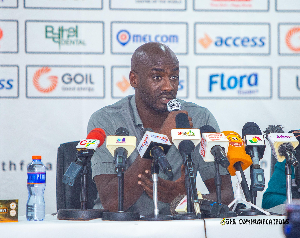With a stable macro-economic environment, reduction of Ghana's debt and good governance, Ghana's risk and credit rating in the world has improved significantly.
The Organisation of Economic Cooperation and Development (OECD) early this year had revised Ghana's credit risk assessment from band 7 to band 6, thus minimizing the cost of borrowing.
The country's sovereign credit ratings measured by Fitch was upgraded from the B position last year to B+ position this year whilst the Standard and Poors maintained the B+ rating it gave Ghana two years ago.
These developments, according to the Minister of Finance and Economic Planning, Mr. Kwadwo Baah Wiredu, was due to the prudent economic policies being pursued by the New Patriotic Party ( NPP) government.
He said at the meet-the-press series yesterday in Accra that, the sovereign credit ratings may have positive impact on local companies that participate in cross-border transactions with banks and other multinational companies that demand credit lines or actual extension of credit.
The minister said the government was committed to achieving higher ratings and the benefits that came with them.
Addressing the problem of high lending rates, the minister said despite the reduction in inflation and subsequent reduction of Bank of Ghana prime rate and secondary reserve requirement, commercial tending rates have remained relatively high. "The commercial banks have often assigned high secondary reserve requirements as part of the reasons for the prevailing high lending rates but following consultations with the Bank of Ghana, the secondary reserve requirement since August 1, 2005 has been reduced from 35% to 15%. It is expected that this measure would free more resources to the commercial banks for lending to the private sector."
He said the resultant increase in supply of loanable funds should therefore translate into lower commercial lending rates. He called on commercial banks to respond favourably to Bank of Ghana's move by reducing high lending rates accordingly.
Hon. Baah Wiredu stressed that the Government was committed to maintaining the fiscal discipline to continue the reduction of Government borrowing from the banks. "This is expected to make more resources available to the banks for lending at lower rates to the private sector," he added.
On capital inflows, the minister said for 2005, a total amount of $285.33 million was pledged, out of which $81.75 million had been received so far.
He said the country was expecting a one-off disbursement from the World Bank and African Development Bank, totaling $155m, together with Germany's base and the two thirds of the performance tranche of $7m. "In all, we are expecting about $179.25m by mid September 2005."
He reiterated that the delay in the disbursement in the first half was due to the fact that Boards of the World Bank and the AfDB were not able to meet as scheduled.
Attending to the Millennium Challenge Account (MCA), he said the MCA proposal was for a five-year Compact focused on the integrated development of Ghana's agro-business potential to drive accelerated private-sector-led growth and to reduce poverty levels. Ghana is targeting an amount of about US$300 million to be concentrated on three identified regions, the Afram Plains, the Savelugu Nanton District and the Southern Horticulture Belt covering the Central, Greater Accra, Eastern and parts of the Volta regions.
The sites with a total target area of 27,000 hectares are earmarked for the cultivation of high value crops and cash crops.
For the allocation of HIPC funds for 2005, he said parliamentary approval had been given for the following formula to be utilised: Domestic Debt Interest Payment, 20%, Sectoral Programmes/Activities, 60%, District Assemblies, 10%, and Contingency, 10%.
Talking about the G8 Debt Cancellation, he disclosed that out of an external debt of about US$6.2billion, 89% was owed to multilateral institutions, notably the World Bank and the 11% was owed to bilateral and commercial creditors.
On the issue of per capita income, the minister reiterated that there was ongoing work by the Ghana Statistical Service (GSS) and very shortly, the Government Statistician would speak to it but preliminary reports indicate that GDP was currently understated by about 20 to 30 percent. If we take all these into consideration, we will all understand why the President said our per capita income is about $600.
Present were the Minister of Information, Dan Botwe and his deputy Hon. Shelly Botchwey, deputy ministers of Finance and Economic Planning, Dr. Anthony Osei Akoto and Mr. Agyemang Manu.
The first quarter bulletin of the finance ministry called Ghana Economy and Finance was launched.
Business News of Wednesday, 24 August 2005
Source: Chronicle
















